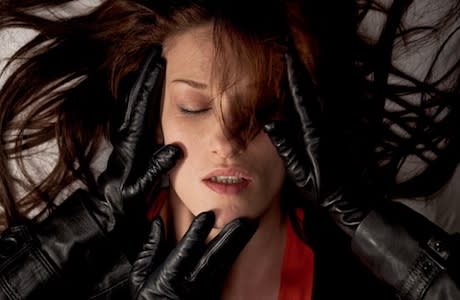Enigmatic, reverent, confrontational, perplexing and nostalgic, Helene Cattet and Bruno Forzani's dizzying, expressionistic homage to the Italian Giallo pictures of the '70s is all of these things and more.
Since they're operating within the confines of a genre not known for placing a great deal of emphasis on plot, the duo behind the highly experimental Amer use the blank slate of that expectation (or lack thereof) to indulge in their almost virtuosic gift for symbolic montages. The way they compose image association is so artsy it would give Sergei Eisenstein some Southern blood flow from beyond the grave.
At no point does The Strange Colour of Your Body's Tears try anything resembling a straightforward narrative; it's far too enamoured with its giddy, indulgent bombast to overtly attempt penetrability. But within that kaleidoscopic visual bravado and aggressively sensual, often-maddening audio is a clever, cheeky, damn-near coherent story. This isn't the sort of film designed to be capable of being fully decoded in a single viewing.
Putting aside the deliberately jarring, recurring black and white scene of erotic knife play, which makes its accusation of voyeurism via sound-reinforced, snap-shot editing, until later in the film, when it serves as an uncomfortable punctuation mark to sadomasochistic revelations, Tears involves a man investigating his wife's disappearance with the aid of a local detective.
As they question the eccentric tenants of a lavishly designed art-nouveau residential erection in Brussels, the two men slowly begin to uncover a strange history of sex and violence, the phantoms of which permeate the very walls. Undoubtedly, there are many ways to read The Strange Colour of Your Body's Tears, many of them likely deliberate, and the highly interpretive nature of this melange of acutely tactile sensations and emotions will likely gain it as many acolytes as detractors.
Charting a labyrinthine path through fractured memory, obsessive yearning and damaging shame, this audacious, lushly colour-saturated Freudian bloodbath doesn't merely pay homage to the Giallos of yore, it adds to the brain-tickling critique of the psychology behind what has historically been the haven of the prettiest of horror's hollow, femininity-fearing baubles.
Furthering the directors' conceit of rejuvenating and repurposing the tools of the trade employed during a very specific phase of slasher film history, a stellar score that borrows dazzling psychedelic motifs from the classic composers of the '70s will further thrill expectant fans of the genre.
(Bac Films)Since they're operating within the confines of a genre not known for placing a great deal of emphasis on plot, the duo behind the highly experimental Amer use the blank slate of that expectation (or lack thereof) to indulge in their almost virtuosic gift for symbolic montages. The way they compose image association is so artsy it would give Sergei Eisenstein some Southern blood flow from beyond the grave.
At no point does The Strange Colour of Your Body's Tears try anything resembling a straightforward narrative; it's far too enamoured with its giddy, indulgent bombast to overtly attempt penetrability. But within that kaleidoscopic visual bravado and aggressively sensual, often-maddening audio is a clever, cheeky, damn-near coherent story. This isn't the sort of film designed to be capable of being fully decoded in a single viewing.
Putting aside the deliberately jarring, recurring black and white scene of erotic knife play, which makes its accusation of voyeurism via sound-reinforced, snap-shot editing, until later in the film, when it serves as an uncomfortable punctuation mark to sadomasochistic revelations, Tears involves a man investigating his wife's disappearance with the aid of a local detective.
As they question the eccentric tenants of a lavishly designed art-nouveau residential erection in Brussels, the two men slowly begin to uncover a strange history of sex and violence, the phantoms of which permeate the very walls. Undoubtedly, there are many ways to read The Strange Colour of Your Body's Tears, many of them likely deliberate, and the highly interpretive nature of this melange of acutely tactile sensations and emotions will likely gain it as many acolytes as detractors.
Charting a labyrinthine path through fractured memory, obsessive yearning and damaging shame, this audacious, lushly colour-saturated Freudian bloodbath doesn't merely pay homage to the Giallos of yore, it adds to the brain-tickling critique of the psychology behind what has historically been the haven of the prettiest of horror's hollow, femininity-fearing baubles.
Furthering the directors' conceit of rejuvenating and repurposing the tools of the trade employed during a very specific phase of slasher film history, a stellar score that borrows dazzling psychedelic motifs from the classic composers of the '70s will further thrill expectant fans of the genre.
